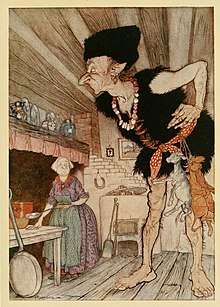Fee-fi-fo-fum
"Fee-fi-fo-fum" is the first line of a historical quatrain (or sometimes couplet) famous for its use in the classic English fairy tale "Jack and the Beanstalk". The poem, as given in Joseph Jacobs' 1890 rendition, is as follows:

Fee-fi-fo-fum,
I smell the blood of an Englishman,
Be he alive, or be he dead
I'll grind his bones to make my bread.[1]
Though the rhyme is tetrametric, it follows no consistent metrical foot; however, the lines correspond roughly to a monosyllabic tetrameter, a dactylic tetrameter, a trochaic tetrameter, and an iambic tetrameter respectively. The poem has historically made use of assonant half rhyme.
Origin
The rhyme appears in the 1596 pamphlet "Haue with You to Saffron-Walden" written by Thomas Nashe, who mentions that the rhyme was already old and its origins obscure:[2]
Fy, Fa and fum,
I smell the blood of an Englishman
In William Shakespeare's play King Lear (c. 1605),[2] the character Edgar exclaims:
Fie, foh, and fum,
I smell the blood of a British man.
The verse in King Lear makes use of the archaic word "fie", used to express disapproval.[3] This word is used repeatedly in Shakespeare's works: King Lear shouts, "Fie, fie, fie! pah, pah!", and in Antony and Cleopatra, Mark Antony exclaims, "O fie, fie, fie!"
The earliest known printed version of the Jack the Giant-Killer tale appears in The history of Jack and the Giants (Newcastle, 1711) and this,[2][4] and later versions (found in chapbooks), include renditions of the poem, recited by the giant Thunderdell:
|
|
Charles Mackay proposes in The Gaelic Etymology of the Languages of Western Europe that the seemingly meaningless string of syllables "Fa fe fi fo fum" is actually a coherent phrase of ancient Gaelic, and that the complete quatrain covertly expresses the Celts' cultural detestation of the invading Angles and Saxons:
- Fa from faich (fa!) "behold!" or "see!"
- Fe from Fiadh (fee-a) "food";
- Fi from fiú "good to eat"
- Fo from fogh (fó) "sufficient" and
- Fum from feum "hunger".
Thus "Fa fe fi fo fum!" becomes "Behold food, good to eat, sufficient for my hunger!"[6]
See also
- Fe, Fi, Fo, Fum, and Phooey, five mice who traveled to and circled the Moon on Apollo 17, four nicknamed after the poem
References
- Tatar, Maria (2002). "Jack and the Beanstalk". The Annotated Classic Fairy Tales. New York: W. W. Norton & Co. pp. 131–144. ISBN 0-393-05163-3.
- McCarthy, William Bernard; Oxford, Cheryl; Sobol, Joseph Daniel, eds. (1994). Jack in Two Worlds: Contemporary North American Tales and Their Tellers (illustrated ed.). UNC Press Books. p. xv. ISBN 9780807844434.
- "Fie". The American Heritage Dictionary of the English Language. The Houghton Mifflin Co. 2000. Archived from the original on October 13, 2008. Retrieved November 13, 2008.
- "The Arthuriad" (PDF). p. 25 (PDF 26).
- History of Jack the Giant Killer. Glasgow: Printed for the booksellers.
- Mackay, Charles (1877). The Gaelic Etymology of the Languages of Western Europe: And More Especially of the English and Lowland Scotch, and Their Slang, Cant, and Colloquial Dialects. Trübner. p. 160. Retrieved 25 August 2015.